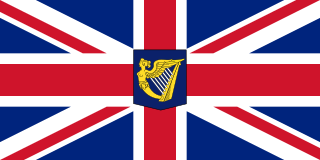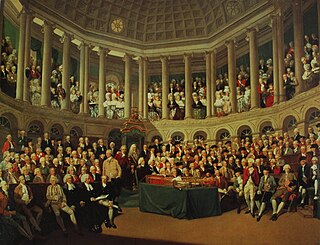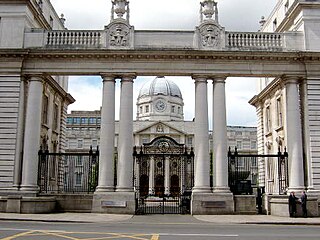| (1921–72) |
 |
|---|
This is a list of by-elections to the Northern Ireland House of Commons , from its creation in 1921 until its abolition in 1972.
| (1921–72) |
 |
|---|
This is a list of by-elections to the Northern Ireland House of Commons , from its creation in 1921 until its abolition in 1972.

The Parliament of the United Kingdom of Great Britain and Northern Ireland is the supreme legislative body of the United Kingdom, and may also legislate for the Crown Dependencies and the British Overseas Territories. It meets at the Palace of Westminster in London. Parliament possesses legislative supremacy and thereby holds ultimate power over all other political bodies in the United Kingdom and the Overseas Territories. While Parliament is bicameral, it has three parts: the sovereign, the House of Lords, and the House of Commons. The three parts acting together to legislate may be described as the King-in-Parliament. The Crown normally acts on the advice of the prime minister, and the powers of the House of Lords are limited to only delaying legislation.

The United Kingdom has three distinctly different legal systems, each of which derives from a particular geographical area for a variety of historical reasons: English law, Scots law, Northern Ireland law, and, since 2007, calls for a fourth type, that of purely Welsh law as a result of Welsh devolution, with further calls for a Welsh justice system.

The Government of Ireland Act 1920 was an act of the Parliament of the United Kingdom. The Act's long title was "An Act to provide for the better government of Ireland"; it is also known as the Fourth Home Rule Bill or (inaccurately) as the Fourth Home Rule Act and informally known as the Partition Act. The Act was intended to partition Ireland into two self-governing polities: the six north-eastern counties were to form "Northern Ireland", while the larger part of the country was to form "Southern Ireland". Both territories were to remain part of the United Kingdom of Great Britain and Ireland and provision was made for their future reunification through a Council of Ireland. The Act was passed by the British Parliament in November 1920, received royal assent in December and came into force on 3 May 1921.

Southern Ireland was the larger of the two parts of Ireland that were created when Ireland was partitioned by the Government of Ireland Act 1920. It comprised 26 of the 32 counties of Ireland or about five-sixths of the area of the island, whilst the remaining six counties, which occupied most of Ulster in the north of the island, formed Northern Ireland. Southern Ireland included County Donegal, despite it being the largest county in Ulster and the most northerly county in all of Ireland.

The prime minister of Northern Ireland was the head of the Government of Northern Ireland between 1921 and 1972. No such office was provided for in the Government of Ireland Act 1920; however, the Lord Lieutenant of Ireland, as with governors-general in other Westminster systems such as in Canada, chose to appoint someone to head the executive even though no such post existed in statute law. The office-holder assumed the title prime minister to draw parallels with the prime minister of the United Kingdom. On the advice of the new prime minister, the lord lieutenant then created the Department of the Prime Minister. The office of Prime Minister of Northern Ireland was suspended in 1972 and then abolished in 1973, along with the contemporary government, when direct rule of Northern Ireland was transferred to London.

The Parliament of Northern Ireland was the home rule legislature of Northern Ireland, created under the Government of Ireland Act 1920, which sat from 7 June 1921 to 30 March 1972, when it was suspended because of its inability to restore order during The Troubles, resulting in the introduction of direct rule. It was abolished under the Northern Ireland Constitution Act 1973.

The House of Commons is the name for the elected lower house of the bicameral parliaments of the United Kingdom and Canada. In both of these countries, the Commons holds much more legislative power than the nominally upper house of parliament. The leader of the majority party in the House of Commons by convention becomes the prime minister. Other parliaments have also had a lower house called the "House of Commons".
The Alliance Party of Northern Ireland, or simply Alliance, is a liberal and centrist political party in Northern Ireland. Following the 2022 Northern Ireland Assembly election, it was the third-largest party in the Northern Ireland Assembly, holding seventeen seats, and broke through by placing third in first preference votes in the 2019 European Parliament election and polling third-highest regionally at the 2019 UK general election. The party won one of the three Northern Ireland seats in the European Parliament, and one seat, North Down, in the House of Commons, the lower house of the Parliament of the United Kingdom.

The Parliament of Southern Ireland was a Home Rule legislature established by the British Government during the Irish War of Independence under the Government of Ireland Act 1920. It was designed to legislate for Southern Ireland, a political entity which was created by the British Government to solve the issue of rising Irish nationalism and the issue of partitionism, while retaining the whole of Ireland as part of the United Kingdom.

The Senate of Northern Ireland was the upper house of the Parliament of Northern Ireland created by the Government of Ireland Act 1920. It was abolished with the passing of the Northern Ireland Constitution Act 1973.

The House of Commons of Northern Ireland was the lower house of the Parliament of Northern Ireland created under the Government of Ireland Act 1920. The upper house in the bicameral parliament was called the Senate. It was abolished with the passing of the Northern Ireland Constitution Act 1973.

Parliament Buildings, often referred to as Stormont, because of its location in the Stormont Estate area of Belfast, is the seat of the Northern Ireland Assembly, the devolved legislature for the region. The purpose-built building, designed by Arnold Thornely, and constructed by Stewart & Partners, was opened by Edward, Prince of Wales, in 1932.

Hillsborough Castle is an official government residence in Northern Ireland. It is the official residence of the Secretary of State for Northern Ireland, and the official residence in Northern Ireland of the British monarch and other members of the British royal family when they visit the region, as well as a guest house for prominent international visitors.

In the United Kingdom (UK), each of the electoral areas or divisions called constituencies elects one member to the House of Commons.

During British Summer Time (BST), civil time in the United Kingdom is advanced one hour forward of Greenwich Mean Time (GMT), in effect changing the time zone from UTC±00:00 to UTC+01:00, so that mornings have one hour less daylight, and evenings one hour more.

In the United Kingdom, a member of Parliament (MP) is an individual elected to serve in the House of Commons, the lower house of the Parliament of the United Kingdom.

Sir Charles Norman Lockhart Stronge, 8th Baronet, MC, PC, JP was a senior Ulster Unionist Party politician in Northern Ireland.
The Northern Ireland Affairs Select Committee is a select committee of the House of Commons in the Parliament of the United Kingdom. The committee's remit is to examine the expenditure, administration and policy of the Northern Ireland Office and its associated public bodies. Select Committees work in both houses and report on governmental departments and economic affairs.
The Nationalist Party was the continuation of the Irish Parliamentary Party (IPP), and was formed after the partition of Ireland, by the Northern Ireland-based members of the IPP.

The Home Rule movement was a movement that campaigned for self-government for Ireland within the United Kingdom of Great Britain and Ireland. It was the dominant political movement of Irish nationalism from 1870 to the end of World War I.